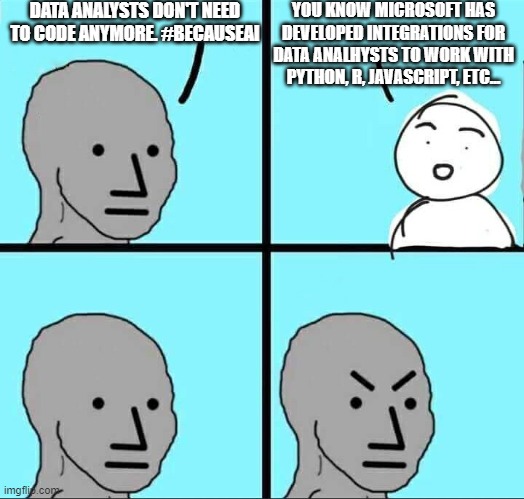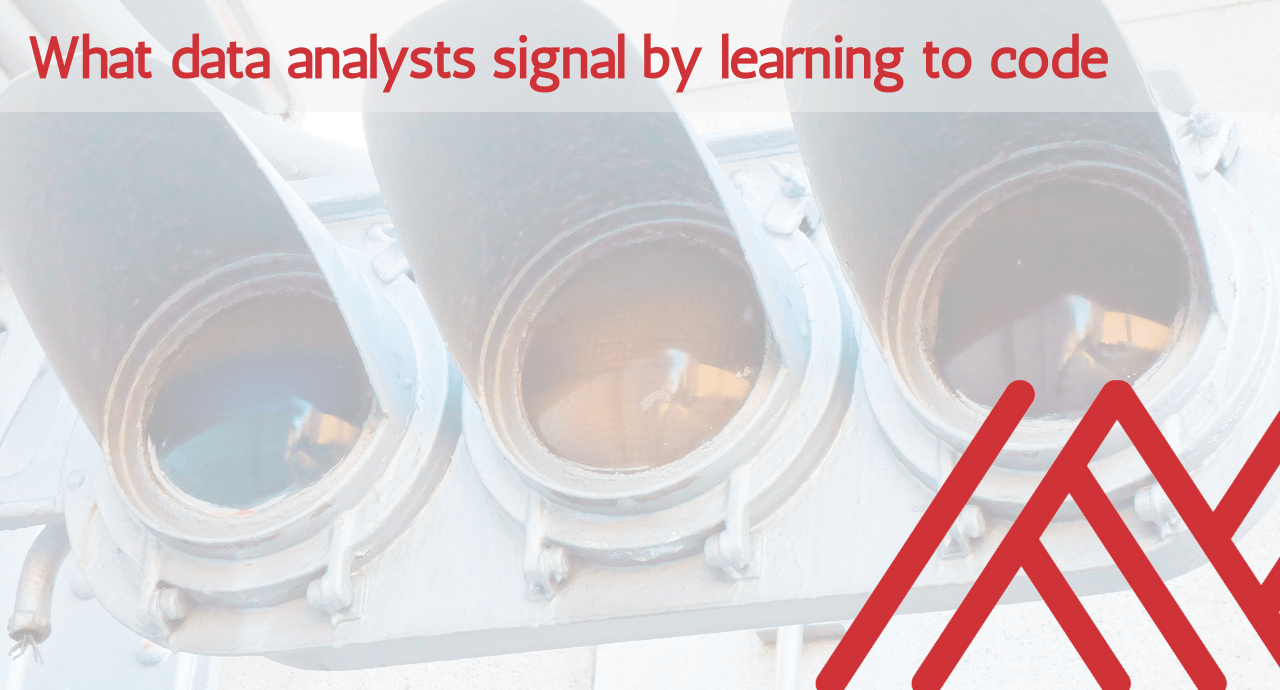Should data analysts learn to code? This is a question “we” at the blog discuss quite often. In our estimation, the marginal benefit for the typical data analyst exceeds the marginal cost — if they’ve worked with Excel, they understand functions and object names to some extent, so making the jump isn’t as far-fetched as it may seem.
“But I’ll never use it!”
Now, a typical objection for analysts learning to code is that “they’ll never use it.” fair enough. Who didn’t ask (or think of asking) “when are we ever going to use this?” as a student.
To be fair, some analysts do just fine work without any code. If it ain’t broken, don’t fix it (or add any more downloads). Even in these cases, learning a bit about code will provide helpful context to how computers work and what good software does.
Other analysts might be interested in learning to code, but figure the window is closing on its usefulness. After all, won’t AI and other advanced technology negate any of the technical skills a current analyst needs?
I don’t think there will ever be a time where an analyst doesn’t need to understand a bit about computing. But let’s focus on the here and now. Microsoft is dumping millions of dollars so that data analysts can work with R and Python alongside its own BI tools. Would they be doing this if coding has no future?

What I’m trying to say here is that “I won’t learn to code because I’m never going to use it” may not be as airtight as it seems.
But where things really break down is (naturally) in the economics.
Employers don’t know you from Adam
Now if you’re reading this blog, you’re probably the ideal data analyst every employer is looking for. But they don’t know that. In fact, there’s a lot about your potential performance that they are pretty left in the dark about.
You may know that you don’t particularly enjoy learning new things or following complicated procedures, but an employer can easily miss out on these traits over the relatively brief hiring process.
In other words, there is information asymmetry in the employer/employee dynamics: you know things the employer doesn’t, and could possibly use that to your advantage (by getting hired when you really suck).
Break the asymmetry with signalling
Employers, being aware of this, look for sources of information that signal the underlying traits they’re looking for. After all, they can’t assess if you’re a decent analyst given the scarce resources available at the time of hiring, due to information asymmetry. This signalling is meant to break the asymmetry.
Learn more about information asymmetry at Marginal Revolution University:
Education signalling has been around
If this sounds crazy to you, think about a college diploma. How many of the classes listed on your transcript are immediately valuable to an employer? And even if they were, couldn’t you just say you know that stuff and the employer have no idea (information asymmetry)?
The diploma acts as a signal that you have at least some of the consistency and resilience that comes with a full-time job. These are again those types of traits that are easily lost under information asymmetry, that matter quite a bit.
Learning to code is an analyst’s signal
Now here’s how I see this relate to data analytics careers.
As mentioned, a lot of analysts aren’t using code in their current roles. This could be because IT doesn’t want them to, they’ve bought some fancy low/no-code data software, whatever.
Given this reality, it may seem silly for a data analyst to put their effort into learning how to code. For reasons stated earlier, I don’t think that’s true. But regardless, it’s still a great signal. You see, employers do want analysts who can:
- Teach themselves new skills
- Work effectively with computing
- Take their professions seriously
These skills aren’t necessarily about the coding itself, or how coding can be used as an analyst, but what learning to code says about you as an analyst — or, more geekily, how it reduces the information asymmetry.

“But couldn’t I fake it?”
All this talk about the benefits of expressing your coding knowledge raises the question: couldn’t you just say you know how to code? Isn’t that just more information asymmetry?
Enter more signalling mechanisms: certifications, a portfolio, blog posts, etc. I’d say most employers are going to resonate most strongly with certifications, as they leverage the brand equity of an authoritative outside institution.
Learn to code, even if you don’t “use” it
For these reasons, I strongly encourage data analysts to learn a bit about coding, especially those on the hiring market. While this is anecdotal, I have seen data analysts start to bulk up their coding skills and soon after see a spike in employer interest.
Still not convinced? Burning Glass found that jobs requiring coding paid 35% more than those that don’t. So maybe treating learning to code as a mere signal doesn’t do it justice for your career. Perhaps if you learn to code, you’ll be put on more interesting and lucrative projects; who knows?
Now what?
If my rambling has you interested (or maybe it’s the Burning Glass statistic?) in learning to code as a data analyst, you’re in the right place. Be sure to subscribe to my newsletter below for access to my analytics learning resource library.
I look forward to seeing what you do with this knowledge. Happy signalling!
